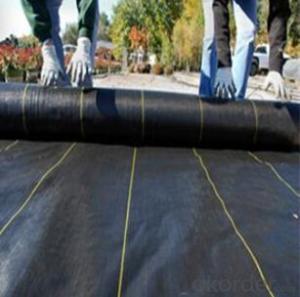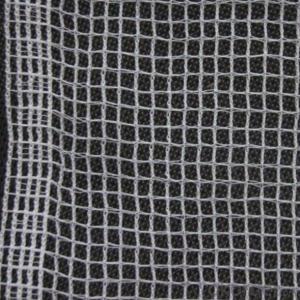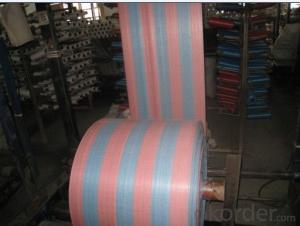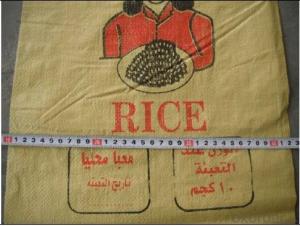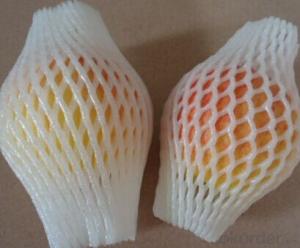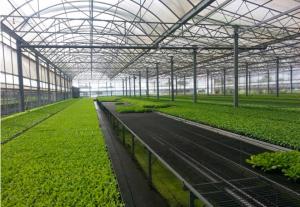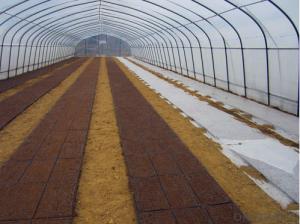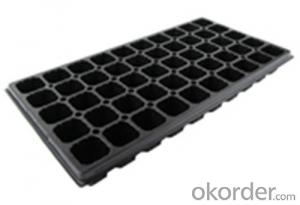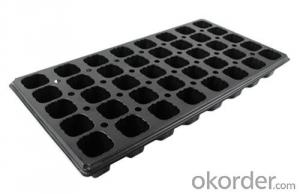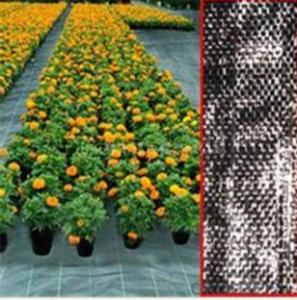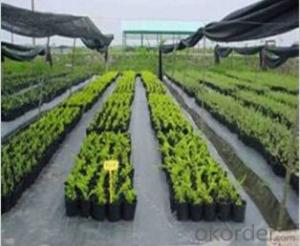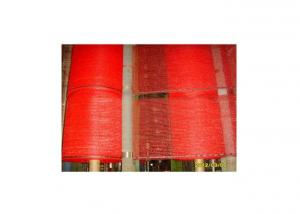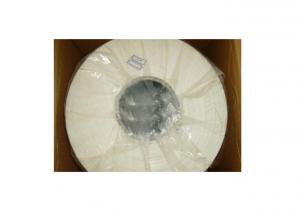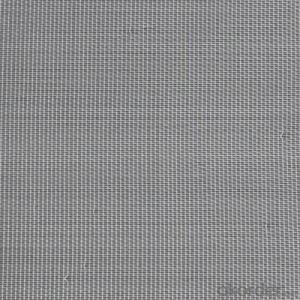weed mat for earth work
- Loading Port:
- China Main Port
- Payment Terms:
- TT OR LC
- Min Order Qty:
- -
- Supply Capability:
- -
OKorder Service Pledge
OKorder Financial Service
You Might Also Like
Name: PP woven fabric for weed control and water savings
Feature:
Material: PP, virgin material or recycled material
Unit weight: 140g, 175g, 180g, 200g, 230g, 260g, 300g, 350g, 420g, 480g, 670g
Width: 50cm-600cm
Length: As per ur request
Color: Black with green/white grid
Tearing strength: From 0.5 to 2.2kN
Mesh: 10*10, 12*12, 14*14
UV stabilized: Up to your request
Function:
1. Cover crops in the ground surface
2. Can prevent weeds
3. Controlling soil humidity and the temperature
4. Against the insect
5. Does not affect the growth of the crops
6. Long service life
Packaging & Delivery
| Packaging Detail: | Rolls on cardboard tubes & wrapped in plastic with color label (or any customized) |
| Delivery Detail: | 20-30 days |
Specifications
1aaMaterial:new HDPE + UV
2aacolor / size as require
3aaWeight 60-180gsm
4) Width: below 4 m
5) Long working life,non-toxi
Usages:
v can effectively prevent the ground produce weeds, keep the floor clean.
v in favor of the growth of the root, prevent root rot.
v to prevent the growth of extra potted flower, improve the quality of potted flower.
v be helpful for cultivation and management: weaving with one-way mark line, in greenhouse , put flower POTS or arrange outdoor cultivation matrix, can according to these signs line to accurately arrangement.
v black cloth covered with the regulation to plant the function of the growth cycle, so as to achieve the effect of control time to market of plant .
- Q: This question asks for environmentally friendly options that can replace harmful pesticides and agricultural plastic in farming practices.
- <p>Sustainable alternatives to toxic pesticides and agricultural plastic include integrated pest management (IPM), which uses biological control, habitat manipulation, and selective use of pesticides. Organic farming practices avoid synthetic chemicals and rely on natural methods like crop rotation, cover cropping, and composting. Biodegradable mulches can replace plastic, reducing soil erosion and maintaining moisture. Precision agriculture employs technology to minimize chemical use and maximize yield. Natural pest repellents like neem oil and diatomaceous earth are eco-friendly options. Lastly, promoting biodiversity in farms can help control pests naturally.</p>
- Q: What are some ground cover options for areas with heavy shade and competition?
- Some ground cover options for areas with heavy shade and competition include hostas, ferns, vinca minor, pachysandra, and lamium. These plants are known for their ability to thrive in low light conditions and can outcompete other plants for resources.
- Q: How do you prevent ground cover plants from competing with trees or shrubs?
- One effective way to prevent ground cover plants from competing with trees or shrubs is to create a physical barrier between them. This can be done by installing a root barrier or using landscape fabric. Additionally, regular maintenance such as pruning and removing any invasive ground covers can help minimize competition and ensure the health and growth of the trees or shrubs.
- Q: Have you or someone you know ever had Plastic Surgery?What was done and were you or the person who got it done happy with the results?
- I lost 100 pounds and also had three children. After my weight loss, combined with breast feeding three kids, I had alot of very saggy skin on my stomach and my breasts were VERY saggy. I finally decided to have cosmetic surgery. I had a tummy tuck and a breast lift. They removed about seven inches from my stomach and my breast lifted to their normal position. I did not have implants but can now actually go braless if I want to. I could not be more pleased with the results. I had them both done at the same time. It was outpatient and the surgery took about five hours. I was amazed with how easy the recovery was!! I was back to work full time three weeks after. I would do it all over again in a heartbeat!!
- Q: Are there nursery trays with built-in heating elements?
- Yes, there are nursery trays available in the market that come with built-in heating elements. These trays are specifically designed to provide controlled and consistent heat to promote seed germination and plant growth in a nursery setting.
- Q: How does agricultural plastic affect crop pollinator attraction?
- Agricultural plastic can have both positive and negative effects on crop pollinator attraction. On one hand, plastic mulches can enhance crop yield by improving soil temperature and moisture levels, leading to healthier plants and increased flower production, which in turn attract more pollinators. Plastic row covers can also protect crops from pests, reducing the need for pesticides and promoting a healthier pollinator population. However, excessive use of plastic can hinder pollinator attraction and foraging. Plastic debris, such as discarded mulches or irrigation tubing, can create physical barriers for pollinators, hindering their access to flowers. Additionally, plastic waste can trap or entangle bees and other pollinators, leading to injury or death. Therefore, it is important to use plastic in a responsible and sustainable manner in agriculture to minimize its negative impact on crop pollinator attraction.
- Q: This question asks for the optimal methods and strategies to employ when utilizing plastic mulch in agricultural settings.
- <p>The best practices for using agricultural plastic mulch include selecting the right type of mulch for the specific crop and climate, ensuring proper installation to prevent weed growth and water evaporation, and maintaining the mulch to prolong its lifespan. It's also crucial to consider the environmental impact and plan for the mulch's disposal or recycling. Additionally, integrating crop rotation and soil health management practices can enhance the benefits of plastic mulch, such as improved soil temperature, reduced water usage, and increased crop yield. Regular monitoring for pest and disease issues is also recommended to prevent any negative impacts on the crop health.</p>
- Q: What are some reasons why we need to conserve plastic bags?
- A better question is why should we use 100's of something a year that's disposable and that is weaker and inferior to its re-usable counterpart? Plastic bags take up a lot of resources to manufacture, ship, and dispose of/recycle and account for a huge amount of our landfill trash. That's when they don't float away and get mixed into a natural or urban environment. In the natural environment they harm animals. So what are the drawbacks to NOT using them?... anyone else hear crickets?
- Q: (I have my tongue piercing for a little over 3 weeks now.)Ok, so I just had my tongue ring changed two days ago to a ring that has a shorter bar, but bigger metal balls. Unfortunately, since the switch I cracked/chipped my tooth (from biting down on one of the metal balls.....yeah, that sucked!) Now I am terrified of the metal balls. I heard that plastic balls are better and won't crack your teeth, so I went out and bought some. When I was switching to the plastic balls, I noticed that the plastic balls that I bought were much bigger than metal ones that I already have.My questions are:Should I stick with the plastic ones or should I stick with the smaller metal ones??? Would the really small metal balls crack my teeth too???Thank you in advance for your answers! Serious answers only.....
- This Site Might Help You. RE: Steel vs Plastic Tongue ring....? (I have my tongue piercing for a little over 3 weeks now.) Ok, so I just had my tongue ring changed two days ago to a ring that has a shorter bar, but bigger metal balls. Unfortunately, since the switch I cracked/chipped my tooth (from biting down on one of the metal balls.....yeah, that...
- Q: Can nursery trays be used for growing annual flowers?
- Yes, nursery trays can be used for growing annual flowers. They provide a convenient and organized way to start seeds or propagate cuttings, allowing for easy transplanting once the plants are established. Additionally, nursery trays often have drainage holes and are designed to retain moisture, creating a favorable environment for successful growth of annual flowers.
Send your message to us
weed mat for earth work
- Loading Port:
- China Main Port
- Payment Terms:
- TT OR LC
- Min Order Qty:
- -
- Supply Capability:
- -
OKorder Service Pledge
OKorder Financial Service
Similar products
Hot products
Hot Searches
Related keywords
